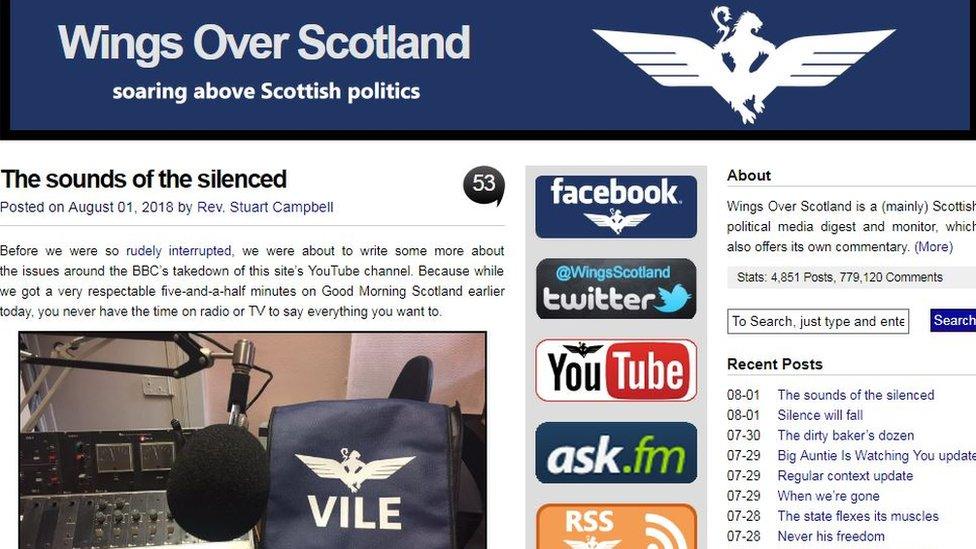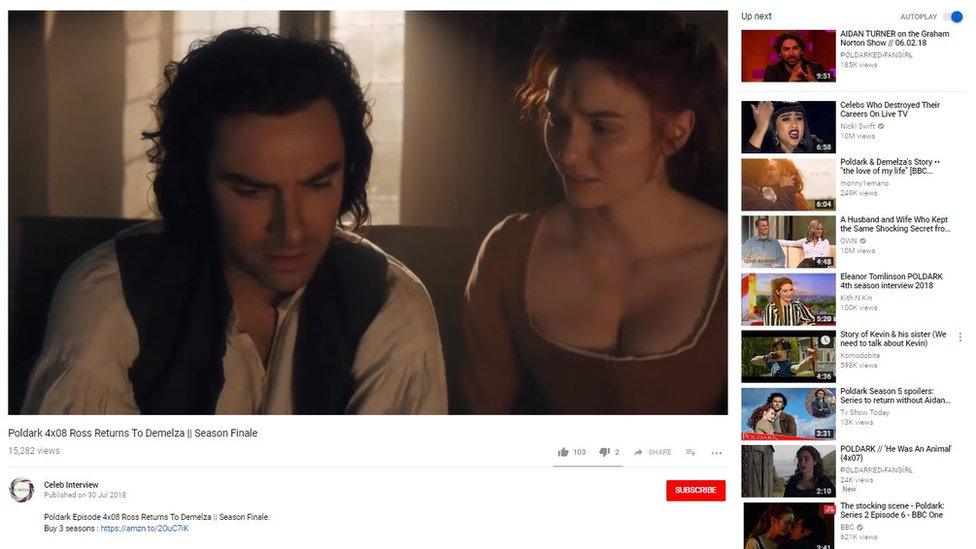BBC criticised after Wings Over Scotland has YouTube channel removed
- Published

Wings Over Scotland is Scotland's most prominent pro-independence website
A pro-independence blogger has criticised the BBC after his YouTube channel was closed over claims it contained copyrighted material.
YouTube pulled the plug on the Wings Over Scotland channel after the BBC highlighted 13 videos that had been uploaded to it.
The broadcaster said it regularly took action to protect its copyright.
But Stuart Campbell, who runs Wings Over Scotland, insists the videos should not have been taken down.
He argues they are covered by "fair dealing" exemptions to copyright law, which allow material to be used for the purposes of "criticism, review and reporting current events".
However, fair dealing rules only allow a "reasonable and necessary" amount of someone else's work to be used.
Mr Campbell told the BBC's Good Morning Scotland programme that the 13 videos were among "hundreds" posted on his YouTube channel before it simply "vanished" without any warning at the weekend.
The channel of another prominent independence campaigner, Peter Curran, was also closed after the BBC highlighted copyrighted material on it.
YouTube operates a "three strikes" policy, which means anyone accused of at least three copyright infringements automatically has their channel removed.
Mr Campbell, who is Scotland's best-known political blogger, said the BBC's takedown notice to YouTube had been signed by a "specialist intellectual lawyer at the BBC's legal department in London".
And he said he would have "given consideration" to removing the videos if he had been asked, in order to prevent his entire channel being removed.

Mr Campbell questioned why his videos had been removed while other channels using BBC content remain on YouTube
He added: "I am sure the takedown notice the BBC sent didn't specifically say 'and please shut the entire channel down'.
"But that's because it didn't have to. They know fine that if they file 13 takedown demands it will definitely lead to the entire channel being killed because 13 is more than three."
He argued that "pretty much any news broadcast" falls under the fair dealing category, adding: "Politicians' comments are public domain.
"I think it would be a very uncomfortable situation if a state-funded broadcaster was able to effectively suppress any politician's comments it felt like just because they happened to be the one that recorded them."
Mr Campbell also claimed the BBC appeared to be targeting pro-independence channels while turning a blind eye to other political sites that used its material - an accusation strongly denied by the broadcaster, which says it has taken similar action against channels "across the political spectrum".
And he claimed Scottish Labour councillor Scott Arthur appeared to have received "some kind of special treatment" as he was allowed to keep his channel open after agreeing to mark videos contested by the BBC as "private".
Allow X content?
This article contains content provided by X. We ask for your permission before anything is loaded, as they may be using cookies and other technologies. You may want to read X’s cookie policy, external and privacy policy, external before accepting. To view this content choose ‘accept and continue’.
He said: "There are plenty of other political YouTube channels that have lots and lots of BBC content on them.
"There's various political parties and other unionist political commentators that have lots of BBC stuff and none of those appear to have been taken down."
Mr Campbell has been backed by former Scottish first minister Alex Salmond, who has written to the BBC's director general seeking assurance that "the BBC as a public service broadcaster has not set its face against fair comment and freedom of speech and further is not pursuing a campaign against sites which support Scottish independence".
In a statement, the BBC said it takes action to protect its copyright "whenever we receive complaints about large volumes of our material being posted or used without authorisation".
The statement added: "This action is normally limited to asking for individual videos to be removed and the BBC did not ask or demand for these whole channels to be taken down. That was a decision for YouTube alone.
"We act irrespective of the political views of the infringing YouTube channels and have taken action against the use of our material by individuals or organisations from across the political spectrum.
"There is a standard process in place if these channels wish to challenge the take down orders and we will consider any representations carefully."